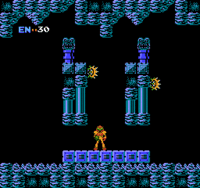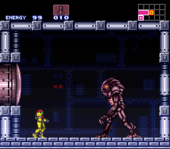Brinstar
| Brinstar | |
|---|---|
| File:Stage21 080107g-l.jpg File:OldSamusSymbol.gif | |
| Universe | Metroid |
| Appears in | Melee, Brawl |
| Availability | Starter in Melee Starter in Brawl |
| Crate type | Futuristic (SSBB only) |
Brinstar is the default Metroid stage that first appeared in Super Smash Bros. Melee. This stage is based after the first area of Planet Zebes from the original Metroid. The stage consists of a base platform, two sides held by fleshy stalk-like poles, and a hovering metallic platform in the centre. There is another fleshy substance in the middle of the base platform that holds the stage together.
Overview
The main feature of this stage is the acid which rises from the bottom, which will damage anyone who touches it, and has large knockback (though it can prevent characters from being KOed from the bottom). The acid will periodically rise high enough to cover the entire stage, save the top-most platform, forcing players to retreat there to avoid damage. There is also a lone Chozo statue in the background which occasionally gets up and walks around. The fleshy stalk-like poles and substance can be destroyed, the latter of which will separate the bottom platform, breaking the stage in half. Both of the destructible substances will start to regenerate if they are not continuously attacked. While regenerating, the substance that holds the stage together is fall-through. After being destroyed, they will grow back once a certain amount of time has passed. It is considered the best Jigglypuff and Ganondorf stage in Melee (due to rest combos and forward aerial combos with Ganon off the lava) and one of the better Mr. Game and Watch and Wario stages in Brawl (due to air camping beneath the platform).
Brinstar is essentially a redesign of Planet Zebes, from the original Super Smash Bros. As Brinstar is also available at the start of Super Smash Bros. Brawl as a Melee Stage, this makes it one of only two stages that has been playable in all three games, the other being Corneria.
Songs in My Music
- Brinstar (Melee)
- Brinstar Depths (Melee)
Origin
Brinstar is the first level that the player has to venture through in original Metroid. In Metroid's Brinstar there are some rooms which feature yellow acid on the ground. If the player goes in the acid it does some damage. In Metroid II: The Return of Samus there are times where acid is in the way of the player's path. If the player kills enough Metroids an earthquake occurs and the acid goes down. Towards the end of Super Metroid, in Mother Brain's room an earthquake occurs and acid starts rising up. While the acid in this stage originated in Metroid, the acid going up and down after an earthquake could be a reference to either Metroid II or Super Metroid (perhaps more likely Super Metroid as Metroid II is set on planet SR388 while Super Metroid is set on Planet Zebes, which is where Brinstar is located).
In Metroid there are secret paths that the player has to take. The secret paths usually involve laying down bombs and exploding certain blocks that led to a new area. In this stage there is this organic material that can be broken up which could likely be a reference to those destructible blocks. Mother Brain's room in both Metroid and Super Metroid feature these things called "Zebetites" which are the life veins for Mother Brain. The player has to shoot them with missiles to destroy them. As the player shoots the veins get thinner and thinner. If the player thins it out and doesn't keep shooting they start to grow back. In this stage two similar veins can be seen. They also retain how the vein can be thinned out and be broken, but in both Metroid games when the veins break they stay broken. This stage has the vein growing back after it has been broken.
Metroid has the player collecting items through the hands of Chozo statues. Super Metroid has kept these Chozo statues except some of them come to life and proceeds to attack the player; these hostile versions are known as Torizos. There are also a few Chozo statues that carry the player across areas that the player wouldn't be able to get to. In the background of this stage, there is a Chozo statue which sits in the same fashion as seen in both Metroid and Super Metroid. There are times when this Chozo statue comes to life and walks across the stage. This is probably a reference to the different types of Chozo statues that come to life in Super Metroid.
In the three Metroid games released at the time of Melee, the player is pretty much always traversing through the caves of planets. This entire stage is featured inside a giant cave. The final boss of Metroid is Mother Brain. As the player shoots her, parts of her pulsate. Mother Brain is also featured in Super Metroid, but she doesn't act in the same manner. In the far background of this stage is a pulsating being which shares some properties with Mother Brain. Out of all the rooms of Brinstar in both Metroid and Super Metroid not one looks similar to the overall design of this stage. [1]
The song that plays on this stage comes from Metroid. There are three tunes that are mixed together. The first part is the music that plays in Brinstar. The second part comes from when Samus makes her first appearance. The third and last part is the song that plays on Metroid's title screen. [2]
Trivia
- There are several references to Mother Brain in this stage. The fleshy stalks that connect the platforms have some characteristics of the 'Zebetites' (life veins of Mother Brain) that Samus had to break before reaching the final boss in Metroid and Super Metroid. Also, the gigantic alien organism in the far background somewhat resembles Mother Brain itself. However, the organism lacks several of Mother Brain's characteristics, such as her recognizable single eye, and the distinctive "wrinkles" and ridges of her brain.
- If the poles on either side of the stage are broken, the platforms that were being supported will tilt at a very sharp angle.
- Near to the Chozo Statue are bricks with angry faces. These appeared in the "Morph Ball room" in the original Metroid.
- Even though the main platform is very thick, any character can pass through it from below, but not above.
- It is possible to perform the Earthquake Glitch here.
- In Brawl during Training Mode, the rise and fall of the acid and the regeneration of the organic parts are not affected by the player's choice of speed.
Gallery
- Stage21 080107h-l.jpg
Brinstar in Brawl.
External links
| Stages in Super Smash Bros. Melee | |
|---|---|
| Starter stages | Brinstar · Corneria · Fountain of Dreams · Great Bay · Green Greens · Icicle Mountain · Jungle Japes · Kongo Jungle · Mushroom Kingdom · Mute City · Onett · Pokémon Stadium · Princess Peach's Castle · Rainbow Cruise · Temple · Venom · Yoshi's Island · Yoshi's Story |
| Unlockable stages | Battlefield · Big Blue · Brinstar Depths · Final Destination · Flat Zone · Fourside · Mushroom Kingdom II · Poké Floats |
| Dream Land · Kongo Jungle · Yoshi's Island | |
|
| |
|---|---|
| Fighters | Samus (SSB · SSBM · SSBB · SSB4 · SSBU) · Zero Suit Samus (SSBB · SSB4 · SSBU) · Ridley (SSBU) · Dark Samus (SSBU) |
| Assist Trophies | Metroid · Dark Samus · Mother Brain |
| Bosses | Ridley · Meta Ridley |
| Stages | Planet Zebes · Brinstar · Brinstar Depths · Frigate Orpheon · Norfair · Pyrosphere Brinstar Escape Shaft (Adventure Mode) |
| Item | Screw Attack · Power Suit Piece |
| Enemies | Geemer · Kihunter · Metroid · Reo · FG II-Graham · Joulion · Zero |
| Other | Gunship · Kraid |
| Trophies, Stickers and Spirits | Trophies (SSBM · SSBB · SSB4) · Stickers · Spirits |
| Music | Brawl · SSB4 · Ultimate |
| Masterpieces | Metroid · Super Metroid |


